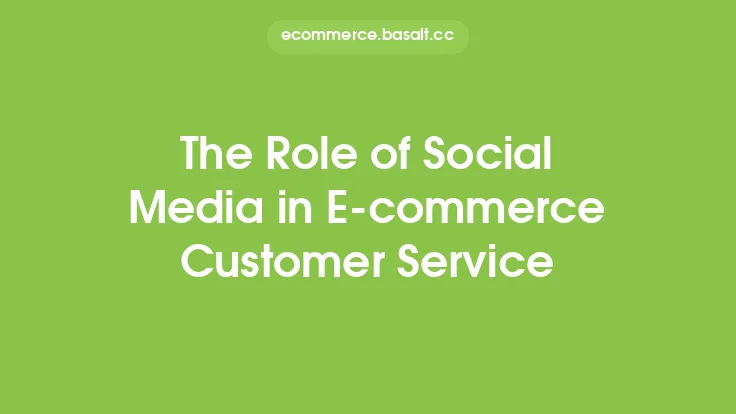In today's digital age, social media has become an essential component of e-commerce marketing strategies. With millions of users on various social media platforms, businesses have a vast opportunity to reach and engage with their target audience. However, measuring the effectiveness of social media marketing for e-commerce is crucial to understand its impact on sales, revenue, and customer acquisition. In this article, we will delve into the world of social media marketing for e-commerce and explore the various metrics and tools used to measure its effectiveness.
Understanding Social Media Metrics
To measure the effectiveness of social media marketing for e-commerce, it's essential to understand the various metrics that are used to track performance. These metrics can be broadly categorized into three types: engagement metrics, conversion metrics, and revenue metrics. Engagement metrics include likes, comments, shares, and followers, which indicate how users are interacting with a brand's social media content. Conversion metrics, such as click-through rates, conversion rates, and lead generation, measure the number of users who take a desired action after interacting with a brand's social media content. Revenue metrics, including return on investment (ROI) and return on ad spend (ROAS), measure the revenue generated from social media marketing efforts.
Setting Up Social Media Tracking
To measure the effectiveness of social media marketing for e-commerce, businesses need to set up tracking mechanisms to collect data on their social media performance. This can be done using social media analytics tools, such as Google Analytics, Facebook Insights, or Twitter Analytics. These tools provide detailed insights into social media metrics, including engagement, conversion, and revenue metrics. Additionally, businesses can use tracking pixels, such as the Facebook pixel or Google tag, to track user behavior and attribute conversions to specific social media campaigns.
Using Social Media Analytics Tools
Social media analytics tools are essential for measuring the effectiveness of social media marketing for e-commerce. These tools provide detailed insights into social media metrics, including engagement, conversion, and revenue metrics. Some popular social media analytics tools include Hootsuite Insights, Sprout Social, and Agorapulse. These tools allow businesses to track their social media performance across multiple platforms, including Facebook, Twitter, Instagram, and LinkedIn. They also provide features such as social media scheduling, content creation, and team collaboration, making it easier for businesses to manage their social media presence.
Measuring Social Media ROI
Measuring the return on investment (ROI) of social media marketing for e-commerce is crucial to understand its impact on revenue and customer acquisition. ROI is calculated by dividing the revenue generated from social media marketing efforts by the cost of those efforts. To measure ROI, businesses need to track the revenue generated from social media campaigns, including sales, leads, and conversions. They also need to track the cost of social media marketing efforts, including ad spend, content creation, and labor costs. By comparing the revenue generated to the cost of social media marketing efforts, businesses can determine the ROI of their social media marketing campaigns.
Conducting Social Media Audits
Conducting regular social media audits is essential to measure the effectiveness of social media marketing for e-commerce. A social media audit involves reviewing a business's social media presence, including their social media profiles, content, and engagement metrics. The audit helps businesses identify areas of improvement, including content gaps, engagement opportunities, and conversion rate optimization. It also helps businesses identify their target audience, including demographics, interests, and behaviors. By conducting regular social media audits, businesses can refine their social media marketing strategy and improve their overall social media performance.
Best Practices for Measuring Social Media Effectiveness
To measure the effectiveness of social media marketing for e-commerce, businesses should follow best practices, including setting clear goals and objectives, tracking key metrics, and using social media analytics tools. Businesses should also conduct regular social media audits to identify areas of improvement and refine their social media marketing strategy. Additionally, businesses should use tracking pixels to attribute conversions to specific social media campaigns and measure the ROI of their social media marketing efforts. By following these best practices, businesses can measure the effectiveness of their social media marketing efforts and improve their overall social media performance.
Common Challenges and Solutions
Measuring the effectiveness of social media marketing for e-commerce can be challenging, especially for businesses with limited resources or expertise. Common challenges include tracking attribution, measuring ROI, and identifying the target audience. To overcome these challenges, businesses can use social media analytics tools, such as Google Analytics or Facebook Insights, to track key metrics and attribute conversions to specific social media campaigns. Businesses can also use tracking pixels, such as the Facebook pixel or Google tag, to track user behavior and measure the ROI of their social media marketing efforts. Additionally, businesses can conduct regular social media audits to identify areas of improvement and refine their social media marketing strategy.
Future of Social Media Marketing for E-commerce
The future of social media marketing for e-commerce is exciting, with new technologies and platforms emerging every day. Artificial intelligence, machine learning, and augmented reality are expected to play a significant role in social media marketing, enabling businesses to personalize their content, improve engagement, and drive conversions. Additionally, social media platforms are expected to become more commerce-friendly, with features such as social media shopping and Instagram Checkout. To stay ahead of the curve, businesses need to stay up-to-date with the latest social media trends and technologies, and continuously measure and refine their social media marketing strategy to improve their overall social media performance.





